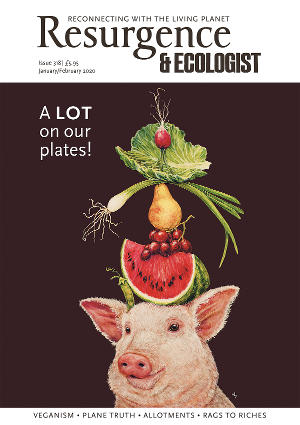Even though I am both a vegan and a climate scientist, my decision to go vegan 17 years ago had nothing to do with climate. I had learnt of the environmental impacts of commodifying animals for food and was concerned about the land use, pollution of waterways, air and communities in which facilities are placed, but my primary concern was for justice for nonhuman animals.
Over the years I read theories by vegans of a wide range of backgrounds and identities. I read black vegan theories on how speciesism upholds white supremacy; queer vegan theories pointing out that we idolise gay penguins in a zoo but don’t give a second thought to queer cows stuck in milk farms; feminist vegan theories on patriarchal exploitation of nonhuman reproduction; and vegan theories of disability showing the entangled ways disability and animality are constructed. All of these and more inform the way I strive to interact with others of all species.
Humans who lack political and economic power are impacted by the oppressive systems that perpetrate the climate crisis, including but not limited to colonialism, capitalism, racism and sexism. This impact should not be minimised. Instead we should learn from the many theories showing how these systems oppress animals as well, connecting the liberation of humans with that of nonhumans. Speciesism is the system of oppression in which humans have power over individuals of all other species, and it is another of many interlocking systems of power and oppression that form the root causes of the climate crisis.
A large share of the emissions from agriculture and land use is from utilisation of animals within the food system. Human supremacy underlies the justification for the speciesism that allows us to normalise the use of animals for food to begin with, but the connections are deeper than that. The clearing of land for use in animal-based agriculture is one of the main drivers of deforestation and biodiversity loss, including in some of the most sensitive ecosystems on the planet, such as the Amazon rainforest. Speciesism and neoliberalism justify this, since the economic value taken from the use of animals in agriculture is seen as more valuable than the priceless biodiversity that is cleared to make way for it.
So many of the ways in which we speak about solutions to climate change fall back on normalised human supremacy, such as feeding seaweed to cows, sustainable fishing, or alternative grazing practices. A vegan approach offers an alternative worldview in which we see nonhumans not as resources but as individuals with self-determination whose needs are best met when they have healthy ecosystems in a stable climate, and the ability to live freely. Nonhuman animals are losing their habitats and lives as a result of the increasing impacts from the climate crisis and the entangled biodiversity crisis. We have a lot to gain in recognising that they are also victims of the environmental degradation perpetrated by segments of the human population and that ecological solutions that place habitat restoration and healthy ecosystems at their centre are key parts of addressing these crimes.
My choice will always be to be vegan. It is a social justice stance that addresses the ills of speciesism, puts this system of oppression into a larger framework of power and privilege that exists amongst human populations, and offers solutions to components of the climate crisis. These solutions are in terms of both emissions reductions and focusing on ecological approaches that prioritise ecosystem health and the wellbeing of both humans and nonhumans. I hope that, as more people are exposed to these ideas, we can all work together towards a vision of the future that will be more just and equitable for all inhabitants of this planet, regardless of their species.






